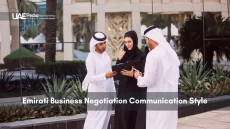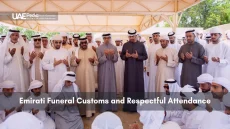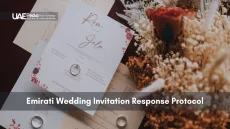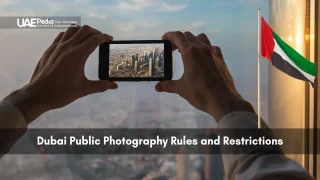In a place where golden dunes meet glittering skylines, every gesture carries weight. While the UAE’s cosmopolitan vibe might suggest otherwise, respect for traditions isn’t just polite—it’s part of the region’s charm (and aligns with essential UAE holiday safety tips).
Think of this as your backstage pass to navigating local customs with ease. Whether you’re savoring Arabic coffee in a majlis or admiring modern architecture, understanding unspoken rules bridges cultures. We’ve crafted this guide with insights from Emirati friends and expats who’ve mastered the art of gracious hosting.
UAE social interaction is governed by Islamic and Bedouin-derived norms that prioritize modesty, hierarchy, and hospitality. Visitors must observe conservative dress (shoulders and knees covered), greet with the right hand, remove shoes when entering homes, and avoid public displays of affection, alcohol outside licensed venues, or photographing people without consent. Prayer times punctuate daily life; non-Muslims should refrain from eating, drinking, or smoking in public during Ramadan daylight hours. Legal penalties for non-compliance range from fines (AED 1,000–500,000) to detention, particularly for drug, alcohol, or cyber-offenses.
Hosts and guests follow ritualized etiquette: dates and Arabic coffee served immediately, food offered and accepted with the right hand, and refusals signaled by lightly shaking the empty cup. Mosques welcome visitors outside prayer times; women must cover hair and limbs, men wear long trousers. Digital conduct is monitored—avoid posting content perceived as disrespectful to the state, religion, or individuals. Emergency contacts: Police 999, Ambulance 997, Fire 998.
You’ll discover how to:
- Balance admiration for innovation with reverence for heritage
- Turn simple gestures—like removing shoes or offering gifts—into meaningful connections
- Decode situations where Western habits might clash with local expectations
From proper greetings to dining dos and don’ts, consider this your roadmap to creating authentic moments. After all, the best travels happen when we move beyond sightseeing to truly see the people around us.
Exploring UAE Cultural Traditions
Imagine sipping cardamom-spiced coffee while stories of pearl divers and falconry swirl around you—this is where the UAE’s heartbeat lives. Beneath its futuristic skyline lies a tapestry of customs that’s both timeless and adaptive. Let’s unpack how to honor these traditions without missing a beat.
Local Customs and Traditions
Hospitality here isn’t just polite—it’s an art form. When invited to a gathering, expect dates and Arabic coffee served in tiny cups (hold it with your right hand!). Dress codes lean modestly: loose fabrics covering shoulders and knees show respect, especially near cultural landmarks. Greetings matter too—a warm “As-salamu alaykum” paired with a gentle handshake bridges gaps instantly.
The Influence of Islamic Culture
Five daily prayer calls echo across cities, pausing routines as shops briefly close. Mosques welcome non-Muslim visitors outside prayer times, but remove shoes and dress conservatively. During Ramadan, avoid eating publicly—it’s a small gesture with big heart. You’ll notice how family gatherings often start with blessings, blending faith with connection.
Whether marveling at Bedouin-inspired architecture or navigating spice-scented souks, these customs aren’t hurdles—they’re invitations. Master them, and you’ll unlock doors to laughter-filled majlis chats and friendships that outlast your trip.
Read More:
Mastering Dubai Hosting Visitors Home Etiquette
Picture this: you’re stepping into a space where tradition and warmth collide. Navigating social codes here isn’t about rigid rules—it’s about showing care through thoughtful actions. Let’s turn potential awkwardness into connection.
Key Do’s and Don’ts for Guests
Start with greetings—a smile and “As-salamu alaykum” paired with a light handshake (right hand only!) sets the tone. Remove shoes when entering homes unless told otherwise. At meals, wait to be seated and use your right hand for eating or passing dishes. Public spaces demand modesty: save affectionate gestures for private settings.
Never refuse coffee or dates—it’s considered rude. Avoid pointing feet toward others or discussing sensitive topics like politics. If unsure, mirror your host’s pace. As one local friend says: “Generosity flows when respect leads.”
Over 80% of Emirati hosts view guest refusal of refreshments as impoliteRef.: “10 Important Etiquette Rules to Follow in Dubai” (2024). Fodor’s Travel Guide. Fodors
Why Etiquette Enhances Your Visit
Simple courtesies transform interactions. Arriving 15 minutes late shows flexibility, but public areas require punctuality. A calm demeanor matters—raised voices draw unwanted attention. Tourists often overlook how following local visa regulations aligns with broader cultural respect.
Remember: what’s casual elsewhere might offend here. Dressing modestly, avoiding alcohol unless offered, and asking permission before photos shows awareness. These aren’t restrictions—they’re keys to deeper experiences. Master them, and you’ll find invitations flowing as freely as the cardamom coffee.
Dress Code Guidelines: Embracing Modesty for Men and Women
Navigating style here means blending comfort with cultural awareness. The UAE’s mix of modern energy and traditional values shines through clothing choices—think breathable fabrics that honor modesty without sacrificing personal flair.
Breathable fabrics (cotton, linen) offer comfort but may require careful laundering in humid monthsRef.: “UAE – Language, Culture, Customs & Etiquette” (2025). Commisceo Global.
Women’s Dressing Tips in Public and Mosques
Lightweight maxi dresses or loose pants paired with tunics work wonders. Keep shoulders covered and hemlines below the knee—scarves double as stylish accessories and quick cover-ups. Visiting mosques? Grab the complimentary abaya (flowing robe) and headscarf provided at most sites. As one designer friend advises: “Dress like the sun—bright but covered.”
| Setting | Women’s Attire | Men’s Attire |
|---|---|---|
| Public Areas | Covered shoulders/knees, no sheer fabrics | Collared shirts, full-length pants |
| Resorts & Beaches | Swimwear allowed (avoid thongs) | Shorts above knee acceptable |
| Mosques | Abaya + headscarf (often provided) | Long pants, no sleeveless tops |
| Homes | Casual but modest (ask about shoe removal) | Avoid tank tops unless specified |
Men’s Recommendations for Appropriate Attire
Skip the muscle tanks—opt for polo shirts or breathable button-downs. Knee-length shorts work in malls, but mosques demand full-length trousers. Pro tip: pack a light jacket for chilly AC spaces. Need outfit inspiration? Our UAE holiday attire guide breaks down climate-smart options.
Fabrics matter here. Linen and cotton beat polyester in the desert heat. Neutral tones blend seamlessly, while bold patterns add personality without drawing undue attention. Remember: dressing right isn’t about restrictions—it’s your passport to authentic connections.
Warm Greetings and Communication Practices
The art of connection here begins with a smile and a softly spoken phrase—your first step into the rhythm of daily life. In the UAE, greetings act as social glue, blending tradition with modern warmth. Whether meeting shopkeepers or new friends, these moments set the tone for every interaction.
Public affection between spouses is discouraged; even hand‑holding may lead to legal complaints. Hugging or kissing in public is usually seen as provocative. Ref.: “Platinum Heritage (n.d.). Understanding Dubai Rules.”
Traditional Handshakes and Common Phrases
Start with “As-Salaam-Alaikum” (Peace be upon you), paired with a light handshake using your right hand. Wait for locals to initiate physical contact, especially between genders. A local guide once shared: “Your palm speaks before your words—keep it gentle and brief.”
| Setting | Appropriate Gesture | Common Phrases |
|---|---|---|
| Markets/Souks | Handshake (right hand only) | “Marhaba” (Hello), “Shukran” (Thank you) |
| Mosques | Verbal greeting only | “As-Salaam-Alaikum” + nod |
| Business Meetings | Handshake after verbal greeting | “Kayfa halak?” (How are you?) |
| Social Gatherings | Hand on heart if unsure | “Sabah al-khair” (Good morning) |
Physical affection stays reserved—save hugs for close friends. If someone declines a handshake, place your right hand over your heart instead. Always ask “Mumkin musafaha?” (May I shake hands?) when uncertain.
In crowded spaces like spice markets, a simple nod and smile work wonders. Remember: greetings here aren’t rushed. Pause, make eye contact, and let conversations unfold naturally. As one café owner put it: “Time respects respect.”
Navigating Public Behavior and Legal Boundaries
Sunlight glints off mirrored towers as you step into a bustling metro station. Here, cultural respect isn’t just polite—it’s enforced through clear rules. The UAE prioritizes harmony in shared spaces, blending modern energy with traditional values.
Loud conversations, gestures, or swearing—even online—can result in hefty fines up to AED 500,000 or imprisonment. Ref.: “UAE Official Portal (2024). Social responsibility.” U.AE
Maintaining a Calm Demeanor in Public Spaces
Raised voices or dramatic gestures draw unwanted attention. A local police officer advises: “Treat public areas like a majlis—keep conversations light and volume low.” Disruptive actions like shouting matches or playing loud music can lead to fines up to AED 2,000 ($545).
| Common Offenses | Potential Fines | Key Reminders |
|---|---|---|
| Public displays of affection | AED 1,000–10,000 | Handholding tolerated, kissing prohibited |
| Swearing/offensive gestures | AED 250–500,000 | Includes online comments |
| Disrespecting government symbols | AED 1,000+ | Avoid photographing restricted areas |
| Public intoxication | AED 5,000+ | Alcohol permitted only in licensed venues |
Three steps to stay compliant:
- Observe posted signs in malls and transport hubs
- Apologize immediately if corrected—defiance worsens outcomes
- Save political opinions for private discussions
During national holidays, flag etiquette matters. A tourism official notes: “Touching or mishandling the UAE emblem carries serious penalties—admire from a respectful distance.”
Insider tip: Crowded souks demand spatial awareness. Keep bags close, avoid abrupt stops, and let locals pass first. These small courtesies keep the peace in high-traffic spaces.
Respecting Religious Customs and Prayer Times
The melodic call to prayer drifts across cities five times daily—a rhythm shaping life in the Emirates. Understanding these moments fosters deeper connections. From bustling markets to quiet neighborhoods, you’ll notice pauses as shops close briefly and streets grow still.
Ignoring prayer-time closures can disrupt visits and result in denied entry to cultural sitesRef.: “Cultural Etiquette in the UAE: Do’s and Don’ts for Tourists” (2025). North Penn Now.
Observing Prayer Calls and Mosque Etiquette
Non-Muslims can visit many mosques outside prayer times, like Abu Dhabi’s Sheikh Zayed Grand Mosque. Remove shoes before entering and dress conservatively—women should cover hair with scarves. A local imam shares: “These spaces welcome curious minds, but reverence opens doors.”
During calls to prayer, lower your voice near mosques. Public areas like malls may pause music or announcements. Need timing help? Apps like Muslim Pro (accessible via eSIM) provide real-time schedules. Pro tip: sunset prayers shift daily—check updates if planning evening activities.
Ramadan brings special considerations. Avoid eating or drinking publicly during daylight hours. Many restaurants remain open with discreet screening. For detailed guidance, our Ramadan etiquette guide explains how to navigate this sacred month thoughtfully.
Three quick reminders:
- Photography inside mosques often requires permission
- Friday midday prayers are longest—plan visits accordingly
- Donations boxes exist, but contributions aren’t expected from guests
Social Customs and the Art of Hospitality
Step across the threshold of an Emirati residence, and you’re not just entering a space—you’re joining a centuries-old dance of generosity. Every gesture here whispers respect, from the moment you slip off your shoes at the door to the final sip of cardamom-infused coffee.
Accepting Offers of Food and Removing Shoes
Leaving footwear outside isn’t just practical—it’s a symbolic cleanse, like brushing sand off before stepping onto pristine carpets. A local chef confides: “Our floors hold stories. Bare feet connect you to them.” Once inside, keep your right hand busy—passing dishes, accepting dates, or raising tiny coffee cups. Left hands stay politely idle.
Declining food? Unthinkable. Even if you’re full, take a bite. Refusing signals distrust in your host’s care. At majlis gatherings, expect endless refills—empty your cup completely to signal you’re done. Pro tip: Lightly shake your cup when declining more coffee to avoid accidental pours.
Three gestures that speak volumes:
- Pause before entering—wait for the host’s nod
- Compliment specific dishes (locals pride themselves on recipes passed through generations)
- Share communal plates clockwise—it keeps the energy flowing
These customs aren’t formalities. They’re love letters to community. Master them, and you’ll taste the real UAE—one sweet date at a time.
Photography and Digital Etiquette in the UAE
Snapping sunset shots over sand dunes? Hold that shutter button—capturing the UAE’s beauty comes with invisible boundaries. While documenting your journey is natural, respecting local privacy laws transforms casual clicks into cultural bridges.
Permission and Privacy Considerations
Always ask before pointing your lens at people. A local photographer advises: “Smiles fade when cameras intrude—gesture toward your device first and say ‘Mumkin sura?’ to request a photo.” In traditional markets or residential areas, err on caution. Close-ups of faces or private property without consent may lead to fines.
Three golden rules for cultural sites:
- Check signage at mosques and heritage villages—tripods often require permits
- Avoid photographing restricted ceremonies or religious practices
- Share images online only with subjects’ approval
Restrictions Around Government and Public Areas
Military installations, airports, and official buildings are strictly off-limits. Even seemingly harmless snaps of police stations or embassies could trigger legal issues. A tour guide recalls: “Tourists once faced questioning for filming a bridge—it connected to a sensitive zone.”
| Location | Photography Rules | Smart Alternative |
|---|---|---|
| Beaches & Parks | Allowed unless marked otherwise | Focus on landscapes, not crowds |
| Shopping Malls | Check with security first | Capture architectural details |
| Public Transport | No photos of staff/security | Share window views instead |
Stay updated using apps like UAE MOI or eSIM-enabled guides that flag restricted zones. Remember—your camera opens doors, but discretion keeps them open.
Embracing Technology: eSIM and On-the-Go Cultural Guides
Your phone buzzes with a desert sunset alert—not magic, just smart travel tech at work. Today’s explorers blend tradition with innovation, using pocket-sized tools to navigate cultural nuances. Let’s unlock how connectivity transforms trips from stressful to seamless.
Stay Informed, Stay Respectful
eSIMs do more than prevent roaming fees. They deliver live updates straight to your lock screen. Imagine getting prayer time notifications before entering a historic district or metro delays rerouting your souk shopping. As one tech-savvy traveler shared: “My eSIM became my etiquette coach—whispering ‘cover your shoulders here’ or ‘remove shoes there’ through push alerts.”
| App | Key Features | Best For |
|---|---|---|
| Airalo | Prayer time alerts + museum entry QR codes | Cultural site visits |
| Holafly | Live transport maps + taxi fare estimates | City navigation |
| UAE MOI | Emergency contacts + legal guidelines | Safety updates |
Three ways tech elevates your trip:
- Scan restaurant menus for halal/haram icons before dining
- Check hotel lobbies’ dress code via augmented reality overlays
- Join virtual majlis sessions to practice Arabic greetings
Connectivity means confidence. Download etiquette guides while boarding your flight. Stream desert playlists during road trips. With 5G coverage stretching across dunes, every tip feels local—even when you’re miles from home.
Wrapping Up: Reflections on Dubai Hosting Visitors Home Etiquette
Every journey through this vibrant country becomes richer when we move thoughtfully—like blending saffron into rice, subtle yet transformative. Whether sharing meals or exploring historic sites, small gestures create lasting bonds. Remember: a light handshake with your right hand opens doors, while modest dress in sacred areas shows reverence for local values.
Tech tools like eSIMs help navigate prayer times and cultural sites effortlessly. Yet tradition remains key—pausing when others pray, accepting food graciously, and keeping voices calm in public spaces. These aren’t rules, but invitations to connect deeply.
As you plan adventures, pack curiosity alongside sunscreen. Let your behavior reflect respect for both desert-rooted customs and modern energy. Tourists who embrace these practices often find unexpected joys—a shopkeeper’s secret tea recipe or an invitation to a family gathering.
Ready to explore? Bookmark this guide, share your stories with us, and step forward with confidence. After all, the truest discoveries happen when we honor the heartbeat of places we visit.
Women need loose, ankle-length clothing and a headscarf in mosques like Sheikh Zayed Grand Mosque. Men should wear long pants and avoid sleeveless tops. Most mosques provide abayas for tourists—just ask politely!
Always ask permission before photographing people, especially Emirati women. Avoid snapping pics of military sites, airports, or palaces—fines apply. Stick to iconic spots like Burj Khalifa or Dubai Frame for Instagram gold.
Use your right hand for handshakes, and say "As-salamu alaykum" (peace be upon you). Men wait for women to initiate physical contact. A slight head nod works if unsure—locals appreciate the effort to respect personal space.
Only licensed venues like hotels or clubs serve alcohol. Public intoxication or drinking on streets risks heavy penalties. Save the champagne toast for your hotel balcony with that epic Burj Al Arab view!
Malls pause music, and some shops close for 15-30 minutes. Non-Muslims can keep exploring quietly but avoid walking directly in front of worshippers. Download a prayer time app to plan museum visits or desert safaris around these moments.
Yes! Follow your host’s lead—many homes have a shoe rack by the door. Bonus tip: Compliment the majlis (sitting area) decor and try Arabic coffee. Leaving a sip in the cup signals you’re done without saying a word.
Absolutely! Providers like Etisalat offer tourist eSIMs with data packs. Use apps like Visit Dubai for real-time etiquette reminders, mosque opening hours, or how to haggle politely at Gold Souk.
Public displays of affection—save hugs and kisses for private. Even holding hands can draw stares in conservative areas. Keep interactions respectful, and you’ll blend right in at Global Village or Louvre Abu Dhabi.
If invited to an iftar meal, accept graciously—it’s a honor. Eat with your right hand, and try dates first. Politely decline if fasting yourself, but phrases like "Shukran" (thank you) show cultural awareness.
Most are off-limits, but Qasr Al Watan Presidential Palace offers public tours. Always check official websites first—security here takes protocol seriously. Your best bet? Stick to guided experiences with approved operators.















